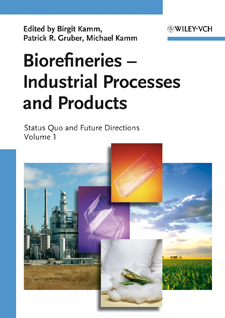|
|
Vol.
29 No. 3
May-June 2007
Biorefineries—Industrial Processes and Products: Status Quo and Future Directions
edited by Birgit Kamm, Patrick R. Gruber, Michael Kamm, with forewords from Henning Hopf and Paul T. Anastas
Wiley-VCH, Weinheim (2005)
ISBN 3-527-31027-4
reviewed by Wladimir Reschetilowski
For the first time, a comprehensive, systematically composed and clearly structured book about the processing of biomass in the form of whole crops in biorefineries has been published. This 900-page two-volume set focuses on the technological principles, as well as the economic aspects, green processes, plants, concepts, and current and forthcoming biobased product lines. In the preface, Hennig Hopf (University of Braunschweig) of the President of the Community of German Chemists, makes it clear that the great challenge to chemistry and chemists is establishing interdisciplinary cooperation in this field. Paul Anastas, director of the Green Chemistry Institute, emphasizes that the enthusiasm of the best scientists and engineers is essential in order to develop a bio-economy with biobased raw materials, processes, and products.
 |
The book, which contains 33 articles by 85 authors, is essentially a survey of current biorefinery research and industrial implementation strategies, particularly in the chemical industry. Thereby, the first volume is divided into four, the second into three main chapters. Volume 1 begins with a review of the history of carbohydrates and the beginnings of integrated biobased production, followed by the definition of the term biorefinery and a brief description of the biorefinery-systems in research and development. Next, it covers the global, technological, and economic dimensions of biomass refining. The remainder of the volume is devoted to the different technologies available, including biorefineries for large-scale industry, lignocellulosic-feedstock biorefineries, whole crop biorefineries, fuel-oriented biorefineries, sugar-based biorefineries, biorefineries based on thermo chemical processes, green biorefineries, and bio catalytic processes to synthesize bulk chemical.
The second volume focuses on biobased product family trees; biobased industrial products, materials, and consumer products; and biobased industry: economy, commercialization and sustainability.
The book uses the principles of logic and efficiency of petrol refineries, to assign product lines and product family trees to biomass. Both volumes should be incorporated into the education of chemists, biotechnologists, and engineers. The book also makes an excellent encyclopaedia (partly due to its very good index) for professionals in the field of biobased raw materials, technologies, and products. www.wiley-vch.de Wladimir Reschetilowski <[email protected]> is Director of the Institute of Industrial Chemistry at the University of Technology Dresden, Germany. He studied chemistry at the Technical University Leuna-Merseburg and received his PhD in 1978. His current research interests are in the field of heterogeneous catalysis and adsorption with the focus on the production of chemicals from biogenic resources.
Page
last modified 15 June 2007.
Copyright © 2003-2007 International Union of Pure and
Applied Chemistry.
Questions regarding the website, please contact [email protected]
|